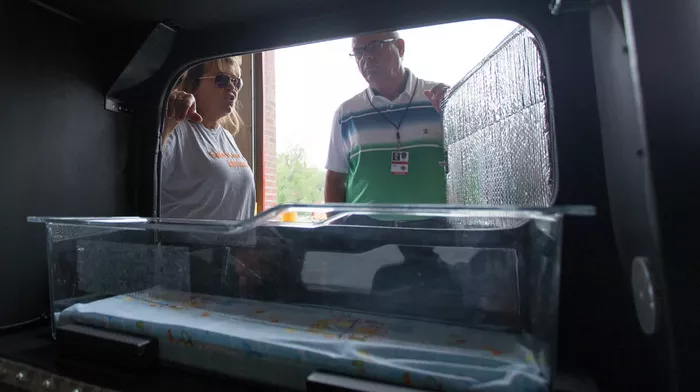CARTERVILLE, IL (WSIL) — Illinois law currently permits individuals to leave an unharmed baby up to 30 days old at a staffed police or fire station, hospital, or emergency care facility. However, this process requires the person to hand the baby directly to someone. A group is advocating for enhanced measures to ensure the safety of these infants.
“The baby box is just an extension of the existing Safe Haven Law,” stated Monica Kelsey, founder and CEO of Safe Haven Baby Boxes.
Nearly 20 states have passed laws allowing these baby boxes, but Illinois has not.
“I don’t change the Safe Haven Law in any state other than the way a parent can surrender the child,” Kelsey explained. “Parents can place the child in an electronically monitored box instead of handing the child to a person.”
These baby boxes are equipped with three alarms that activate at different times when an infant is placed inside. Each box is heated and cooled, and the average time a baby spends in these boxes, located in fire stations and hospital walls, is about two minutes, according to Kelsey.
Although Illinois allows for anonymous infant surrender, some argue that the in-person requirement compromises privacy.
“In a large area like Chicago, anonymity might work,” said Jennifer Glodo, a Southern Illinois resident and Safe Haven box advocate. “But in southern Illinois, where everyone knows everyone, it’s harder to remain anonymous.”
Glodo believes that offering baby boxes would provide more options.
“Statistically, these boxes save lives,” Glodo said. “Women who need to give up their child often feel a lot of shame. This gives them the chance to do so anonymously and safely.”
In Illinois, parents must hand over their infant to a staff member. Kelsey argues that this can be a barrier.
“Some women don’t want to talk to anyone or reveal what they’re doing,” she said. “Why not provide an option for complete anonymity with electronically monitored boxes?”
However, changing the law to allow baby boxes has been challenging. According to Senator Dale Fowler, the Senate Legal Department has raised safety concerns about the boxes. They stated, “Illinois is a Safe Haven State. Any facility can register as a Safe Haven. Baby boxes raise many safety concerns and are not used.”
Glodo wants to see a baby box in southern Illinois, believing it could be a crucial resource.
The legal department also mentioned that baby boxes could be an unfunded mandate that cities might struggle to finance. Kelsey countered this, saying, “95 to 98 percent of all boxes are funded by private donors, not municipalities.”
With modern technology, even volunteer fire departments, which aren’t staffed 24/7, can install a baby box. Kelsey explained, “They must have a camera inside the box for constant monitoring, and it sends notifications to their cell phones.”
In Indiana, where Kelsey lives, there is a baby box with a camera that she can monitor from her cell phone. “If there’s movement in the box, I get a text message before dispatch is notified,” she said.
Despite the challenges, Glodo and Kelsey are determined to push for baby boxes in Illinois.
“I want to raise awareness and start the discussion,” said Glodo. “With more people involved, we can find better solutions for rural areas with limited staff.”
“It might take years, but eventually Illinois will have baby boxes,” Kelsey asserted.
Currently, four states bordering Illinois—Indiana, Kentucky, Missouri, and Iowa—allow Safe Haven Baby Boxes.


